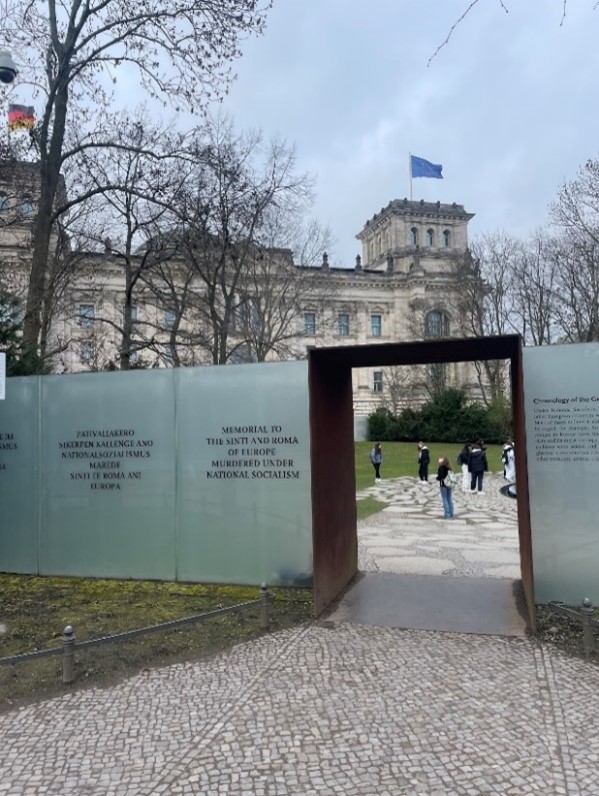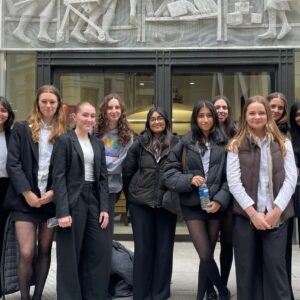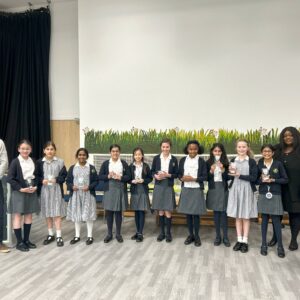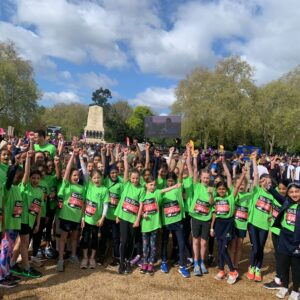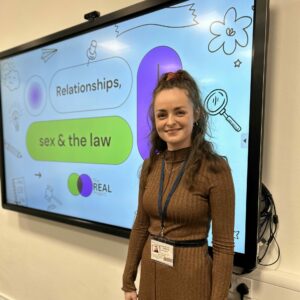News & Events
Year 10 The Road to the Holocaust: Berlin-Krakow
April 19, 2024

Year 10 Historians and German pupils brought their classroom learning to life on a trip to Berlin and Krakow, where they retraced the key events that led to the Holocaust. Their maturity and respect in dealing with difficult topics were evident throughout the trip.
When you experience something, such as concentration camps, through a textbook at the back of a humid history class, none of it feels real. When you are standing in the exact place that Jewish teenagers slept in night after night, children just like us, everything you have been learning comes to life. You gradually recognise how blessed you are to have a roof over your head that doesn’t leak, or to have your own single bed, which isn’t shared with 7 other kids. Everything became real.
–Matha V
From Berlin…
After arriving in Berlin, we began our tour with an exploration of the outside of the Reichstag – Germany’s parliament. We discussed the Reichstag fire and the persecution of politicians by the Nazi Party. Around the building lay memorials to the politicians, Roma and Sinti and gay people murdered by the Nazi regime.
From there we moved on to the majestic Brandenburg gate through to the Holocaust Memorial and the Fuhrer Bunker. This brought to life our history curriculum and enhanced our understanding of the rise of the Nazis. We were also able to begin to explore the Cold War with the physical reminder of the Berlin Wall.
My personal highlight of this trip was being able to buy my favourite German food ‘Nussecken’. I also enjoyed seeing monuments in Berlin like the Brandenburg Gate and the Berlin TV Tower
-Jorjah W
The Holocaust Memorial in Berlin was received with mixed feelings. Although it is meant to be industrialist to represent the industrial nature of the murder in the Holocaust, we were not all convinced it was the right approach for a memorial.
To Krakow…
One of the most memorable moments of the trip was visiting Auschwitz One and Auschwitz-Birkenau. Visiting these places put into perspective just how harrowing these concentration camps were and the severity of the past. I think that it was important for us to go here as we all got a much deeper understanding of this part of history which no textbook alone could do for us. In my opinion, the gas chambers were one of the most significant parts of the tour as they demonstrated the ruthless and revolting attitudes of the Nazi Party.
-Anya M
The following day a coach journey took us into Krakow, Poland. Here, we got to see where the train tracks ended: Auschwitz concentration camp and its neighbouring offshoot, Auschwitz II-Birkenau. We found this a harrowing but hugely important visit as we explored the barracks, gas chambers and museum.
Going to Auschwitz I and Auschwitz Birkenau were the hardest parts of the trip. However, I learned new things about the Holocaust there. I bought ‘The girl in the red coat’ by Roma Ligocka, to learn more about the Holocaust particularly from a child’s perspective. I look forward to reading it soon.
-Jorjah W
In the memorial of all the concentration camps, just seeing how many there were was shocking – the rocks were all shattered and in a circle around the centre pool of water. This was powerful as I never realised the quantity of how many there were and it put it into perspective, especially seeing Auschwitz and understanding fully how terrible the conditions were.
-Olivia G
Later that day we explored Krakow and had the opportunity to visit a Jewish restaurant, which doubled up as a very interesting bookshop! We were treated to traditional Jewish food and music.
The restaurant music was absolutely amazing. One of the pieces played was what I did for my grade 5 on the clarinet. The food was remarkable.
-Sophie J
What was very interesting about the trip was seeing the history and culture of Jewish people before the Holocaust, we had a walking tour through historical sites important to Jewish people and experienced a traditional Jewish restaurant. It was a very emotional experience touring Auschwitz but was a very important and impactful thing to do which made the number and statistics feel incredibly real.
-Tilly C
On the last day we visited a synagogue, exploring the building, graves and memorials. We then visited the Krakow Jewish museum and library where we were fortunate enough to hear from a Holocaust survivor. Her tale was a remarkable and heartbreaking story of her and her mother’s escape from Warsaw Getto and the impact these shocking events have had on her throughout her life.
I really loved the history trip because I was able to learn loads of new things as well as have a lot of fun. On the first day, we did a walking tour of Berlin. This was really interesting, and we were able to see all the historic buildings. On the second day, we headed to Poland. Then on the third day, we went to both of the Auschwitz camps. This was extremely sad but also eye-opening to learn about all that had happened. On the fourth and final day, we were lucky enough to hear from a holocaust survivor who told us her story on how she survived throughout the war. Overall, the trip was great experience.
-Leila I
During our history trip, I really enjoyed visiting lots of important places in Berlin, such as the Reichstag and Brandenburg Gate, and was very interested in learning about lots of Berlin’s social and political history. Visiting two concentration camps in Poland was extremely hard and sad, but it was also interesting and important to learn. Our talk with a Holocaust survivor and the museum exhibition was incredibly moving and fascinating. We had a delicious dinner at a traditional Jewish restaurant in Kraków’s former Jewish quarter and I thought that Kraków is a lovely city. Thank you to Ms Fenwick, Ms Tooke, Ms Sigusch and Ms Howie.
-Sophie C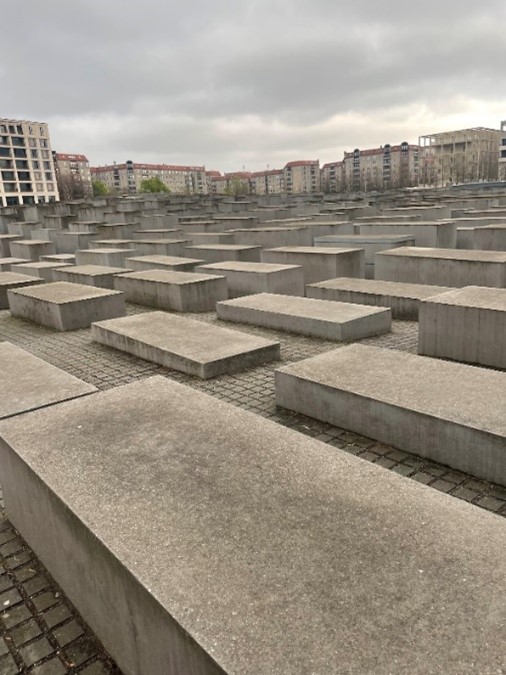
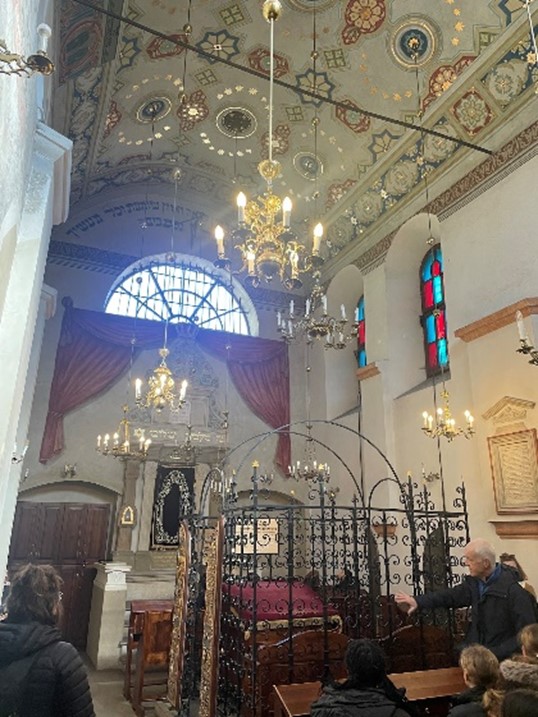
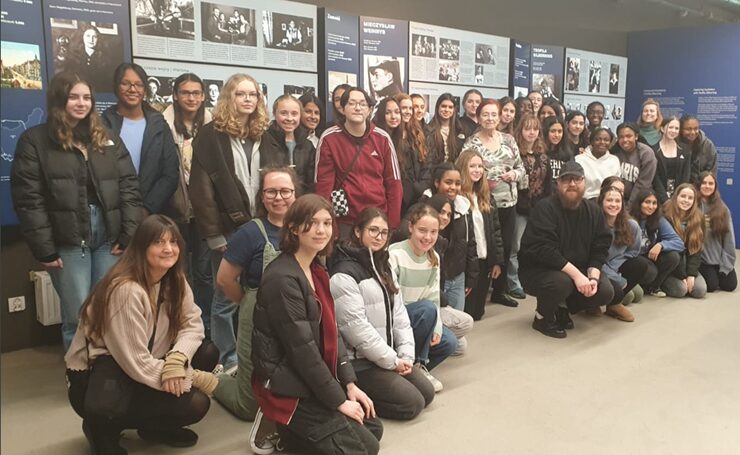
More news
Sixth Form
Lower Sixth GDST Lead Programme 2024
Junior School
Year 5 Wearable Tech Challenge 2024
Junior School
